SQL for MongoDB
In MongoDB and Amazon DocumentDB, to manipulate data or perform other operations, you write scripts for the mongo shell in JavaScript. For developers who query data primarily with SQL, it might be helpful to use SQL for MongoDB or Amazon DocumentDB collections as well. GoLand will translate your SQL queries to JavaScript.
To see the JavaScript version of SQL, right-click a query and select Show JS Script.
The current implementation supports SELECT queries and the following сlauses:
JOIN,WHERE,GROUP BY,HAVING,ORDER BY,LIMIT,OFFSET.
See the JavaScript translation for an SQL query
Right-click a query and select Show JS Script. To copy JavaScript code to the clipboard, click Copy JS Script to Clipboard.
You can change and run the script from the JS Script Preview.
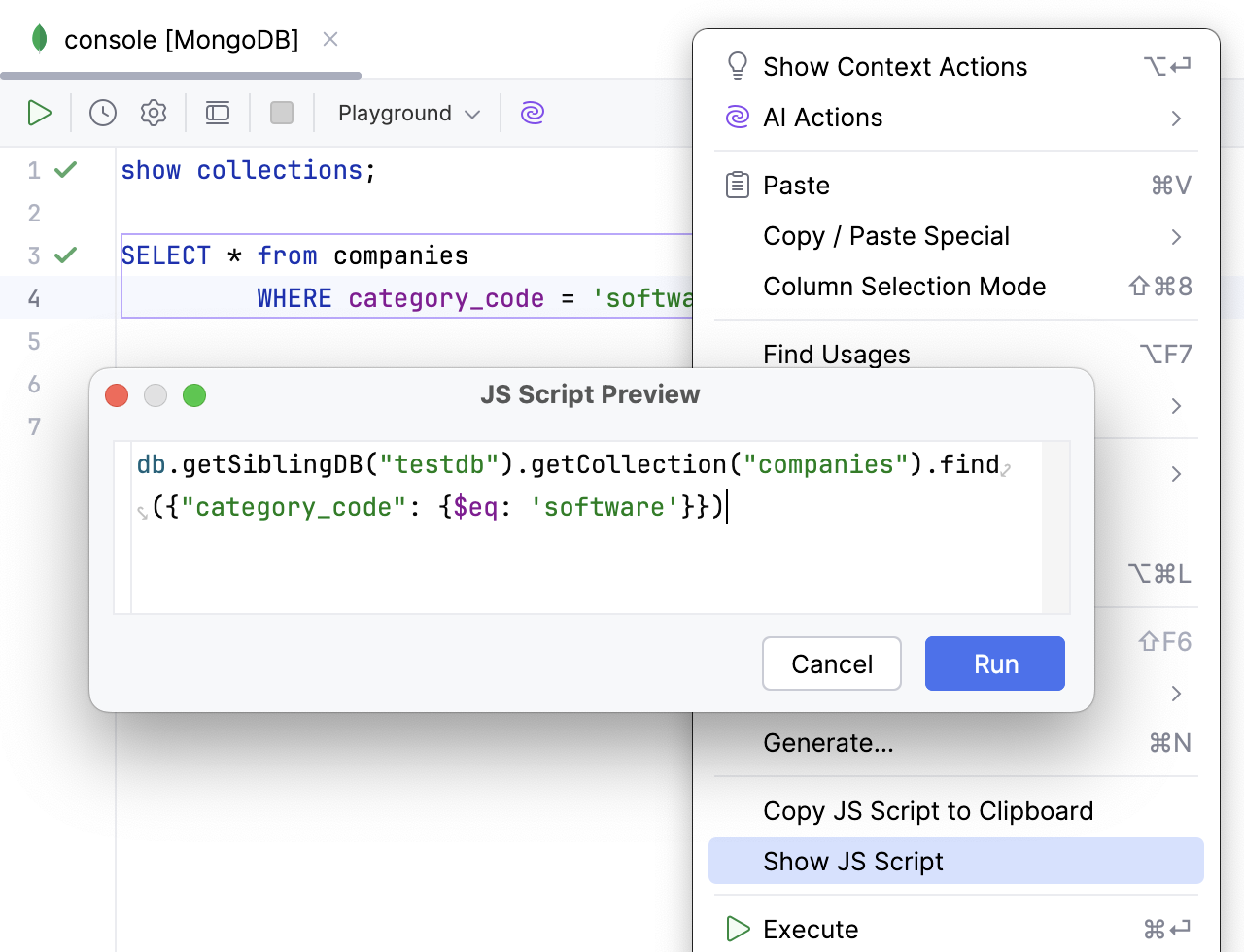
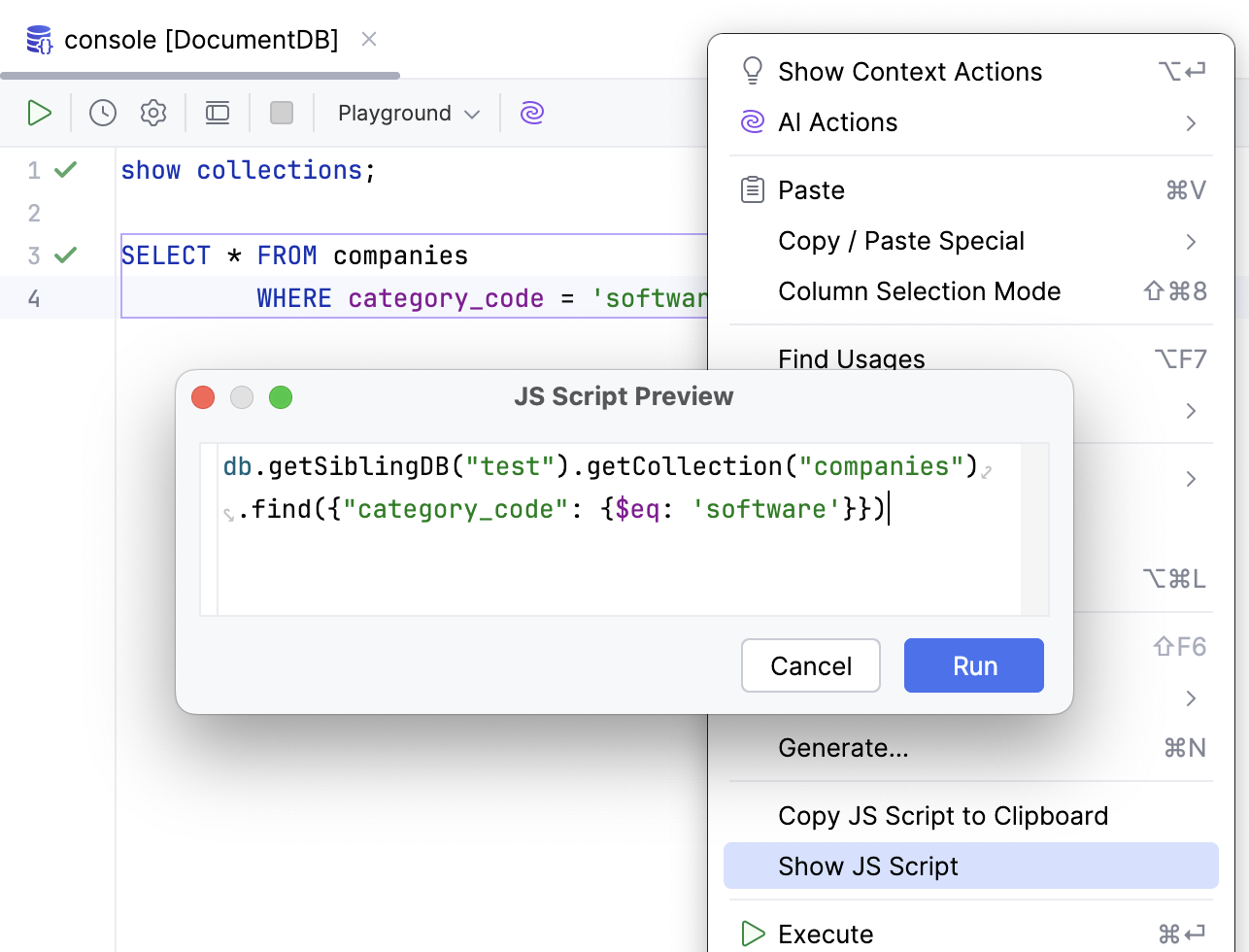
Data types
GoLand supports the following data types:
String, Integer, Float, Boolean
NULL, NAN, INFINITY
Arrays (
[1, 2, 3]) and maps ({a: 1, b: 2, c: 3})
Arrays and maps may include any expressions.
You can use string literals in single or double quotation marks.
Write column names without quotation marks or use a grave accent (`).
Object constructors
You can use the following object constructors: BinData, HexData, UUID, MD5, ObjectID, Date, ISODate, Code, DBRef, RegExp, NumberInt, NumberLong, NumberDecimal, Timestamp, MinKey, MaxKey.
You may use or skip the new keyword. GoLand will add the new keyword to the MongoDB or Amazon DocumentDB query automatically. This feature does not apply to the Date object constructor because of the difference between Date() new Date(). Date() returns the current date as a string and new Date() as a Date object.
If the function name is unknown, GoLand searches for the new keyword before the function name. If the new keyword is present, the name is treated as an object constructor. Otherwise, as a function call. For example, the following query:
will be translated to:
Functions
You can use all the available MongoDB and Amazon DocumentDB aggregation pipeline operators except for map, reduce, filter, and let. Also, you can use COUNT(*) but not COUNT (expression) that is not supported yet.
In MongoDB and Amazon DocumentDB, some functions require named arguments. To use named arguments, use a PostgreSQL-like syntax for the named parameters (for example, => or :=). You will get an error if you do not specify names for the parametrized functions. Consider the following example for the dateToString function:
You can see the list of all the pipeline operators that support named parameters in Aggregation Pipeline Operators at docs.mongodb.com.
Limitations
Due to different approaches to aggregate functions in SQL and MongoDB and Amazon DocumentDB, you cannot use aggregate functions, such as AVG, SUM, MIN, and MAX, as non-aggregate. For example,
SELECT MAX(1,2,3)will not work.In MongoDB and Amazon DocumentDB, functions like
AVG,SUM,MIN, andMAXmay be aggregate and non-aggregate. They are aggregate if they are placed in thegroupblock. Otherwise, they are non-aggregate.In SQL, there is no such dependency, and you can use aggregate functions without the GROUP BY clause (for example,
SELECT AVG(x) FROM t).You cannot call aggregate functions within other aggregate functions.
Operators
Currently, the following functionality is supported:
Operands:
=,==,>=,<=,>,<,<>,!=,+,-,/,*,%,AND,OR,NOT,LIKE,NOT LIKE,IS,IS NOT,IN,NOT IN,BETWEEN,NOT BETWEEN.You can use wildcards for the
LIKEoperator. These wildcards are translated into a valid regular expression for MongoDB or Amazon DocumentDB.
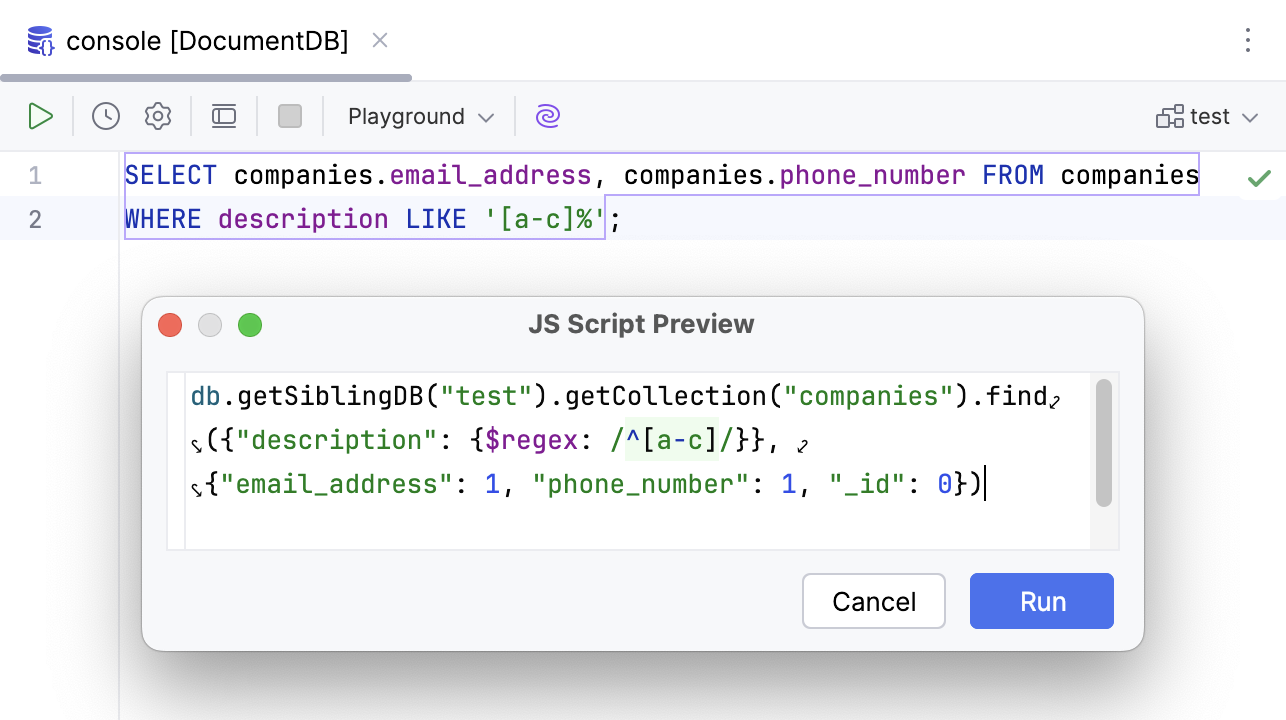
SQL clauses
SELECT
The following features are supported for the SELECT queries.
Options:
DISTINCT,ALL.Aggregate and non-aggregate functions.
Access to embedded fields by using dotted names. Consider the following example.


Limitations
Columns may have aliases. Aliases must not contain periods(
.).
FROM
You can use aliases for tables.
You have to use an alias for a nested
SELECTstatement.You can use nested
SELECTqueries. For example, the following query is valid: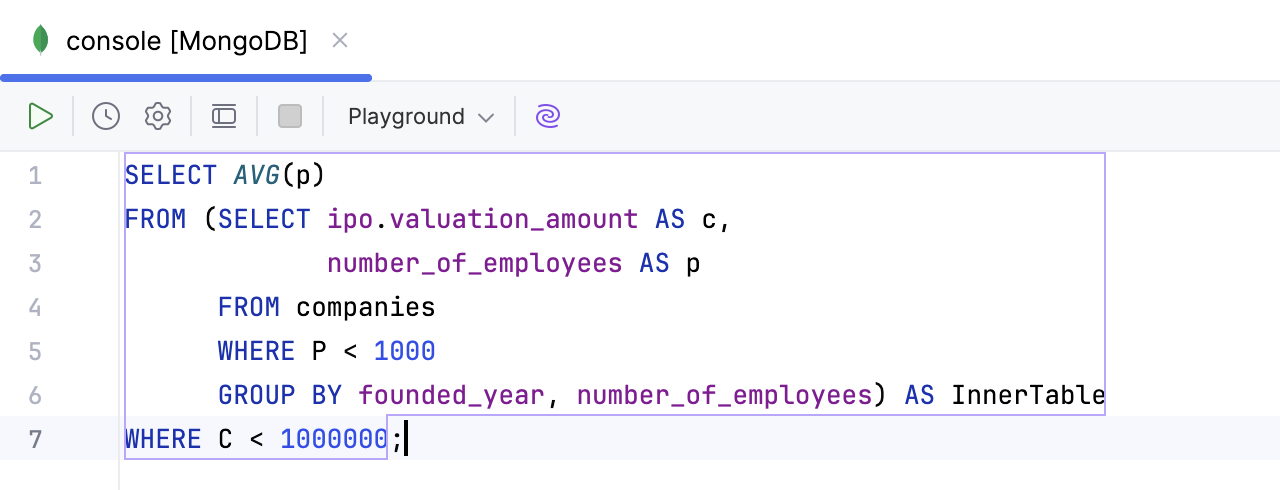
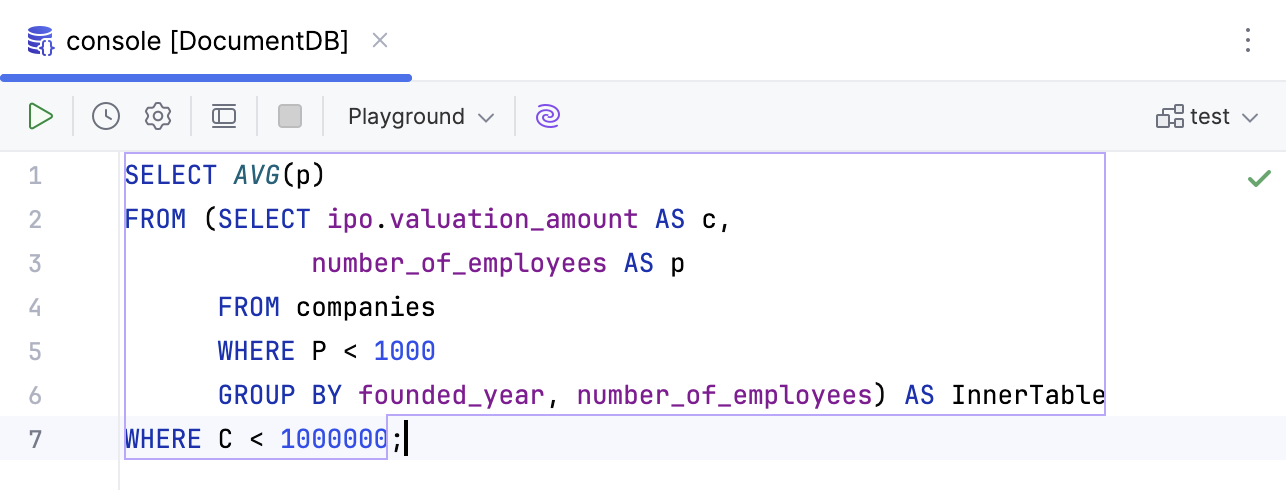
Limitations
Aliases must not contain periods(
.).
JOIN
Only
JOIN(INNER JOIN) andLEFT JOIN(LEFT OUTER JOIN) are supported.Only the
ONcondition is supported.Only one condition in the
ONpart. The following query will result in error:
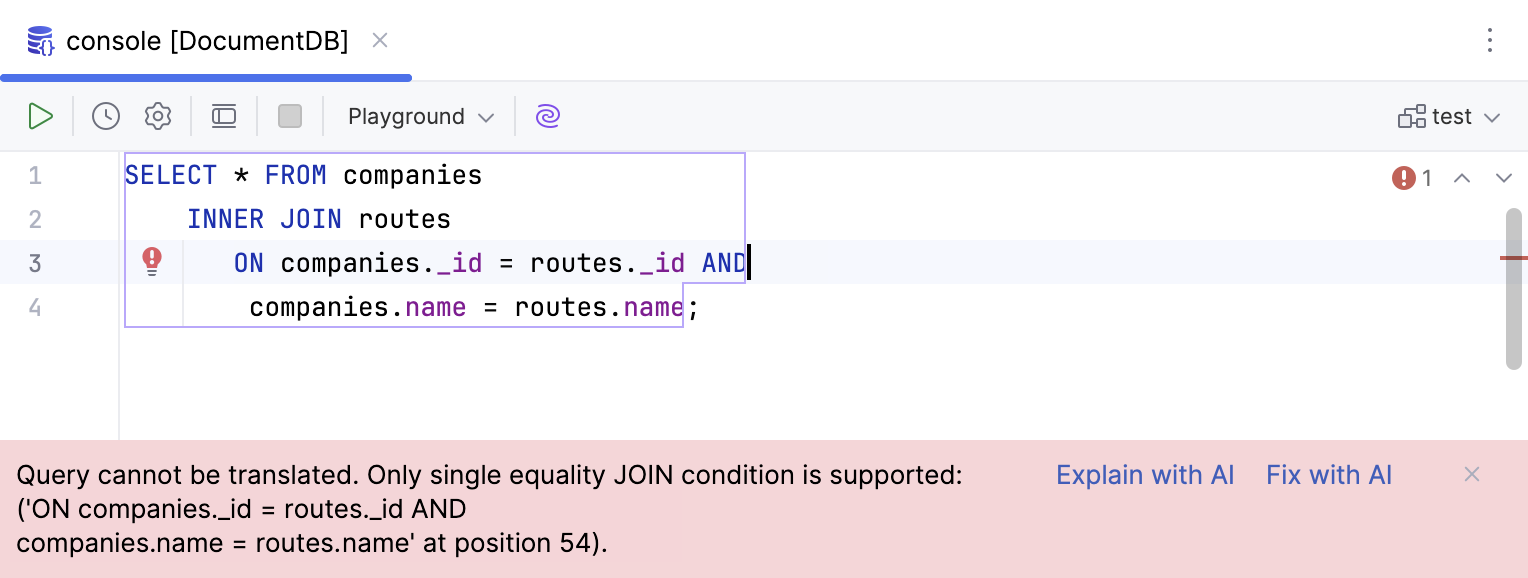
You can use
==or=operators in theONcondition.Multiple
JOINclauses are supported.
Limitations
USINGis not supported.You cannot use a
SELECTstatement as the second argument inJOINclauses.Table names and aliases must not have duplicates in
JOINclauses.
WHERE
LIKEandNOT LIKErequire a string literal. The following query results in error:

GROUP BY
GoLand supports the GROUP BY clause.
The SELECT clause may include expressions that functionally depend on expressions in the GROUP BY clause. You can use embedded fields of a column in the SELECT clause if the column is used in the GROUP BY clause.


HAVING
GoLand supports the HAVING clause.


ORDER BY
GoLand supports the ORDER BY clause. Instead of ORDER BY, you can use SORT BY.


LIMIT
GoLand supports the LIMIT clause.


OFFSET
GoLand supports OFFSET clause.

